|
JOHN PIEPLOW
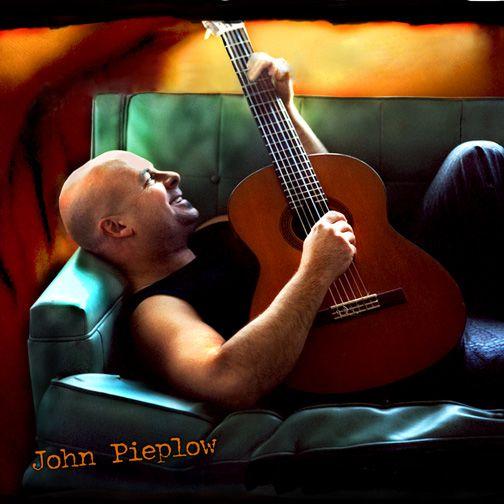 This
edition we spotlight L.A. songwriter, filmmaker and crowd pleaser JOHN
PIEPLOW, looking rather happy with himself here in this photo to the left. And
well he should, given his unique place in the L.A. entertainment inner
universe. John is a darling of a sophisticated set of Hollywoodland's most
diverse talents, ranging from big name filmmakers like Sydney Pollack and Tim
Robbins to musicians like Chris Squire (Yes) to literary agent/musician Joel
Gotler, who plays in his band. How John Pieplow, who has received performer,
songwriter and guitarist honors at L.A.'s annual Rock City Awards, got to be in
the position he is today is enough to turn anyone into a fan. This
edition we spotlight L.A. songwriter, filmmaker and crowd pleaser JOHN
PIEPLOW, looking rather happy with himself here in this photo to the left. And
well he should, given his unique place in the L.A. entertainment inner
universe. John is a darling of a sophisticated set of Hollywoodland's most
diverse talents, ranging from big name filmmakers like Sydney Pollack and Tim
Robbins to musicians like Chris Squire (Yes) to literary agent/musician Joel
Gotler, who plays in his band. How John Pieplow, who has received performer,
songwriter and guitarist honors at L.A.'s annual Rock City Awards, got to be in
the position he is today is enough to turn anyone into a fan.
First
of all, John is an educated and erudite dude, who got early opportunities in his
home town New York City doing work on top level Broadway shows
("Lolita" and "Baby"), then came to the west coast to pursue
film work. He directed the Dee Snider cult classic Strangeland, which has
the ignominious distinction of being the video most frequently stolen from
Blockbuster Video outlets nationwide, and in the course of making that film (in
Colorado) he met other notables, like gonzo journalist Hunter S. Thompson. John
parlayed one success into another and stayed busy doing industrial and
commercial film and television work, including soundtrack composition.
John had always counted music among his primary interests, but criticism of his
first original offering stung him so he buried his musical artist ambitions for
years. Then one day he got a call from someone who wanted him to play The Viper
Room, one of L.A.'s most coveted venue opportunities. The resourceful Mr.
Pieplow met the challenge and over the last four years, rather late in the life
of most aspiring singer-songwriter/entertainers, John Pieplow has become one of
L.A.'s favorite club attractions.
John
recently took on the challenge of responding to RARWRITER.com interview
questions.
JOHN
PIEPLOW
by
RAR
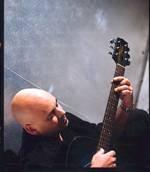
In visiting your MySpace site the first thing one
sees is this quote: "Age Is Not A Number, It's A State of Mind." For a
music figure in a youth obsessed culture, how does being your age feel for you?
First, I don't think music is cemented in a youth-based culture anymore! It
may be the opposite. Boomers have the money for high-priced concerts, and buy
more cd's than young people. Josh Grogan's "Noel" was a huge seller
last year. In fact, it was the biggest seller of 2007 - and that was with only
three months of sales. Then there was the Wal-Mart deal with The Eagles….
Most important, Boomers were raised in a culture where music was relevant and
important. Today, young people don't view music in the same way. They're too
busy with other distractions, like video games and the Internet, to name just
two.
Are there concessions you feel you need to make
to be "age appropriate"? Or do your musical stylings change with age
anyway?
Well, I don't know if my music stylings change with age, I only started
performing a little more then four years ago. Concessions? Never. I am not at
all conscious of trying to win over an audience at any age. I just want to be
truthful to myself about the music I write and perform, which some may consider
broad-based in scope. I don't know.
Who is your audience? Is there a clear
demographic?
I am not entirely sure. When we have played outside Los Angeles, where I am
unknown to the audience, we are received very well by all ages. Would a younger
audience come to the show? We will have to see. It certainly works for Jamie
Cullum. Generally my audience is 28-50, but those are the people who can afford
to go to concerts these days.
Way back in 1983-84, you were involved as
"Film Designer" for the Broadway production of Baby. That show logged
241 performances and racked up 1984 Tony Awards in numerous categories (Best
Musical, Best Book of a Musical, Best Original Score, Best Choreography, Best
Direction of a Musical). What was your background that led to that gig? And
what was the role of "Film Designer" in a stage production?
Well, let me just say I was a "Baby" when I got that job. I had
just finished graduate school with a masters in film, but wasn't ready to take
on the world. I had a chance encounter with Uta Hagen, one of the founders of HB
Studios, one of the premiere acting schools in the world, and she said,
"Don't worry so much about where to put the camera. Work with actors."
And I did, directing many local plays while going to NYU and The New
School.
By the time I graduated I had experience in both film and theater. My first
Broadway show wasn't "Baby," it was "Lolita," starring
Donald Sutherland, and written by Edward Albee.
They asked me to create innovative film sequences and to project them onto
different set pieces and materials. And that's what I did. The Film Designer
credit was made up specifically for me, and other designers like me came after.
But "Lolita" was my first legit job after school. Not bad to be
working with Donald Sutherland and Edward Albee so soon after school. I always
wondered what would have happened had they known how young I really was. Another
show was Terra Nova, Ted Talley's drama (Ted would later win an Oscar for his
screenplay of Silence of the Lambs.) I also directed for Pepsi with Michael
Jackson around that time. I was totally and utterly fearless then, because I was
too young to know better. I miss those days…
When did you come west to L.A.? And was it a
career move?
I came to LA in the mid nineties because my girlfriend at the time was an
actress, and I wanted to direct movies. I had done everything I could in New
York, and, besides, it was just too cold. Ironically, the first movie I ever
wrote and directed came about because my girlfriend was cast in the lead, and
she recommended me for the job. So, I may be the first director ever to get his
break by sleeping with the lead actress! The movie, by the way, was shot in 8
days for $35,000 and went on to gross more then a million dollars. I could write
a book about that movie….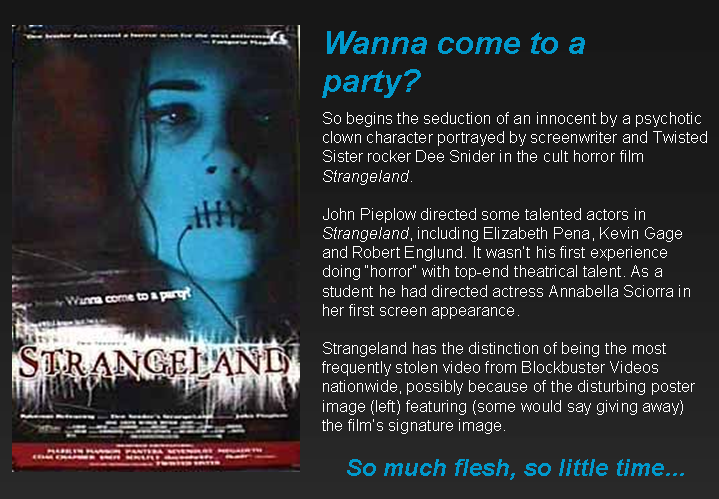
You directed the Dee Snider written and produced
cult favorite StrangeLand, released in 1998. How did that you land that?
I got on a plane at my own expense and met with Dee and the production
company, The Shooting Gallery, in New York. I don't think I ever prepared for
anything more in my life. I was kept in a room for five hours without even being
offered a glass of water. When I left, one of the executives said, "What do
you think, Dee?" And he said, " Well, no else has gotten on a plane,
have they?" It had a great cast, including Elizabeth Pena and Kevin Gage,
with two newcomers, who went on to do many interesting films. Am happy for them
both.
Had you previously been involved with, or been a
fan of, these sorts of "Grindhouse" films (to borrow a term)?
I did a horror short, while in grad school, as a thesis film. It featured
Annabella Sciorra. It was her first film. It premiered at the Toronto Film
Festival. Go figure that one. I didn't even know where Toronto was, since the
first time I was ever on a plane was to direct an industrial in Washington, D.C.
for Sunbeam Bread. I remember getting a nice letter from George "Night of
the Living Dead" Romero once, while I was prepping a film that I wrote that
was to be shot in Pittsburgh. It was a romantic comedy. Or at least I thought
that at the time. Hmmm.
RARWRITER.com has origins in Boulder, Colorado
and I see that you filmed StrangeLand on location in Colorado. Had, or have you,
some connection to the state?
I just loved Colorado from my experiences directing TV commercials for Westin
Hotels in Vail. We were all on the mountain wearing pony oxygen bottles because
the atmosphere was so thin, flatland easterners that we were. There were later
trips in Aspen, etc.
I picked Colorado Springs for two reasons: one the production company wanted
me to shoot the film in Poughkeepsie, New York. If you had ever been to
Poughkeepsie, you would know it would be hard to attract a real cast, which we
did eventually get on StrangeLand. I wanted the snow, too. Sadly the film
started late and all the snow had melted by then. Secondly, there was an extreme
fundamentalist conservative group based in that area. It was ironic that I
directed a satirical move about extreme conservatism in their own backyard. I
still get a chuckle over that one.
You mentioned in a recent email exchange that new
scenes are being added to StrangeLand and that a re-release is planned. I assume
these are scenes deleted from the original final edit?
No, they will be new scenes that will actually be the opening scenes of the
sequel.
Are you involved in this re-release? You also
mentioned that there is a StrangeLand sequel under discussion. Would you be
involved in that?
No. It's Dee Snider's franchise. I have moved on to other things of my own.
When did the music side of your career begin?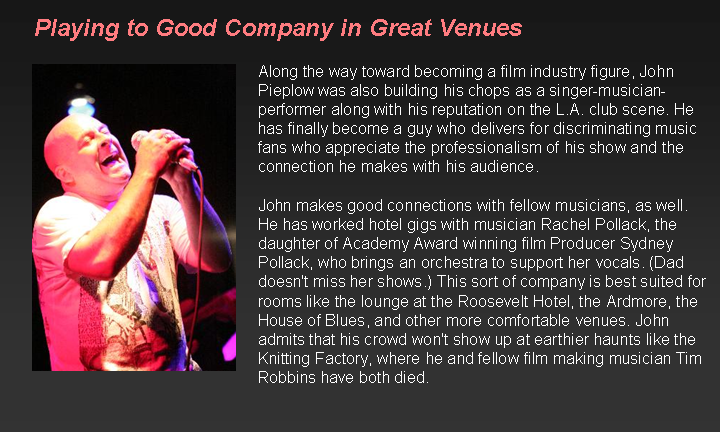
Well, I always dabbled. But never had an interest in it as a career. A
friend's boyfriend trashed the first song I wrote, so I stuck it in a draw for
ten years. I played it once at a party, and then I received a call from a LA
promoter who said a spotter saw me perform that song at a party. He wanted to
book me on Sunset Blvd at The Whisky and Viper Room. I thought it was a friend
playing a joke, so I hung up on him. The promoter called back, cursing. That's
how it started.
Your email exchanges always end with a plea to
"keep live music going." What does live performance represent for you
in your career? Are you, by nature, most inclined toward that live audience
connection? Are you a "performer," as opposed to a "record
guy"?
Whew. The music business is now about live performance. Your only chance to
make a connection with an audience is to perform live. There are just too many
distractions in the world. Put an audience in a club, or a concert venue, and
you have a fighting chance. But you have to get them there, somehow. It is not
just downloading that has diluted the paying-music audience; it is also the lack
of interest.
I am definitely a performer-guy, as opposed to the studio. Always will be. I
never know what will happen on stage. Neither does my audience!
What do club owners like best about you as a
"draw"?
My audience are great boozers and eaters. Lol.
Is L.A. a good town to book your style of
pop-soul? Or is that even a good description of your sound?
It's incredibly tough. It's either hip-hop or hard rock in the clubs; we've
played with both.
Some of your recordings seem, at least to me, to
reveal an affection for the kind of youth-oriented pop that we got during the
British invasion of the mid-1960s. You have catchy melodic lines sung in a
slightly higher register, sort of sweet like a "boy singer." Am I
getting any of this right? Were you, for instance, a fan of groups like The
Raspberries or The Hollies?
I guess. I never think about influences much. I think my music stands on its
own, being a sum total of all of my past music experiences. Funny, we were
booked to open for The Raspberries, recently. Good call.
Who are you a fan of now? Is there someone whose
CD you are currently taken by? Or are you a casual music fan? (This may sound
like a strange question, but I know professional musicians who never listen to
music.)
I am listening to country and western more recently. Seems like that's the
pop music of this era. Am I a casual music fan? Now, yes.
You play quite a divergent range of venues, from
big hall and theater shows to clubs and even really informal stages, like in the
front lobby (like at the East West Tennis Classic). Does this take a lot of
adjusting to calibrate your show to the setting? Does your own performance
change accordingly?
Well, I learned to play "big" doing El Rey Theater shows. It's a
1500 seat theatre. I think we opened for Ambrosia there. By the time we played
the Verizon Wireless Amphitheater, my performing "body language" had
matured, I guess.
The only venue adjustments now, are whether we are headlining or opening for
a major act. Out of respect for the national artists, when we are not the
headliners, I tone it down a little. But even in small settings, I pretty much
lay it all out there.
The other thing I notice is that you seem to
share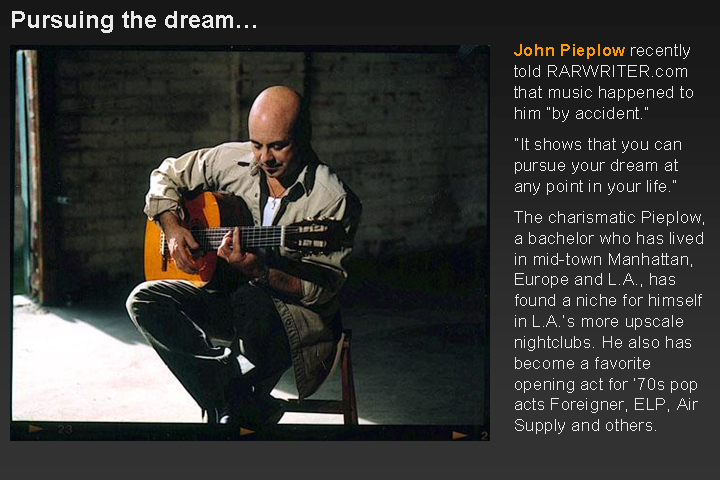 venues with a hugely divergent range of acts, from Huey Lewis to Ambrosia
and Earth Wind & Fire to Chris Botti to The English Beat. Does this present
any special challenges? Or do you see some vein of similarity running through
those acts that make you the perfect bridge artist for such a roster? venues with a hugely divergent range of acts, from Huey Lewis to Ambrosia
and Earth Wind & Fire to Chris Botti to The English Beat. Does this present
any special challenges? Or do you see some vein of similarity running through
those acts that make you the perfect bridge artist for such a roster?
Other then age? No. But they are all older, anyway. Lol. By nature, they are
all excellent performers, and I have learned a lot watching them. Particularly
when we opened for Chicago. Live Nation started booking us for their shows, they
said, because they just didn't have any over-30 acts to do it. Again, that
contact came out of the blue. Our promoter made the intro, but I never expected
to get the shows they gave us. And this year we will be opening for Foreigner.
Apart from being a popular live performer, you
have also worked in film and television, writing and performing the music for
the NBC-produced, ABC prime-time show "Sons and Daughters", produced
by Lorne Michaels. How do you land a gig like that?
I'd met the producer Andrew Singer in Los Angeles and he asked me to submit a
demo. That show was his 23rd un-aired pilot. I wrote and recorded the first
episode in about ten days. I still play some of those songs in shows. Talk about
retro….
And how does it work process-wise?
I sit and write at the computer, usually with a DVD running and a guitar or
keyboard on my lap. Don't know why this works, but I can start and stop more
easily. The tempo is the key for me. Once I get that down, everything else
flows. I guess I just work better under pressure -- no time to waste, better do
it, that sort of thing. I did a soundtrack with "Yes," founder Chris
Squire, too. That was a lot of fun. That film, called "Biker Run," I
think, can still be found in Lion Gate's library and at video stores.
Do you just submit masters to a program editor?
Or do you have any involvement in the production?
Not really. I think the musical composer has to be under the wings of the
director. I learned that from directing. It's rather nice not having the
pressure of the entire production on your shoulders, too. I could probably do
more, but I don't have the time to promote as much as I should. In fact, I don't
do any at all. Mostly everything comes by word-of-mouth.
I believe you are a native New Yorker? Do you get
back often? Or do you play New York?
New York is and will always be my hometown. Lot's of great memories of
walking to movies, great nightlife and friends. Working on Broadway, wasn't bad,
either. It still holds the Woody Allen romantic-notion for me.
You work with talented players. I can't help but
notice that some of your band regulars, like literary agent/manager Joel Gotler,
aren't really the kind of guys you find hanging out at the Guitar Center. What
has been your approach to lining up good players in the competitive L.A. market?
I'd met Joel's niece at the eye doctor one day. That's how we met. I didn't
know at the time that Joel was also Sting's literary manager. We always enjoy
Joel; he is quite the personality, like many of his clients.
My sense of you is largely as an acoustic
guitarist, but you have received nominations as "Best Guitarist" by
the likes of the Rock City News. What is your primary instrument?
Mostly my voice now, and song writing.
What drives John Pieplow these days?
Other then my Ford Escape? Honesty in everything I do.
Do you have a principle ambition currently?
To achieve more balance in my life. I tend to be extremist in everything.
Never resting. I should look into that sometime…
Or are you by nature more of a cavalier type just
taking opportunity as it presents itself?
With regards to the "Big Ticket" items? Yes. They will find you if
it's right.
If something could happen in your life and/or
career that would make you suddenly feel tremendously satisfied with the world,
what would it be?
For my work to be even more relevant getting people to reconnect with
themselves and each other transcending the work and making a positive impact.
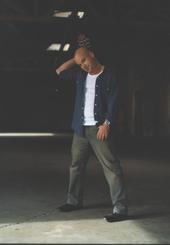
Learn
more about John Pieplow by visiting John
Pieplow's MySpace.
GO TO:
ARTIST NEWS
•
YOU
ARE ON A SPECIAL FEATURES PAGE
|
 |
|
©Rick
Alan Rice (RAR),
May, 2012
|
| 
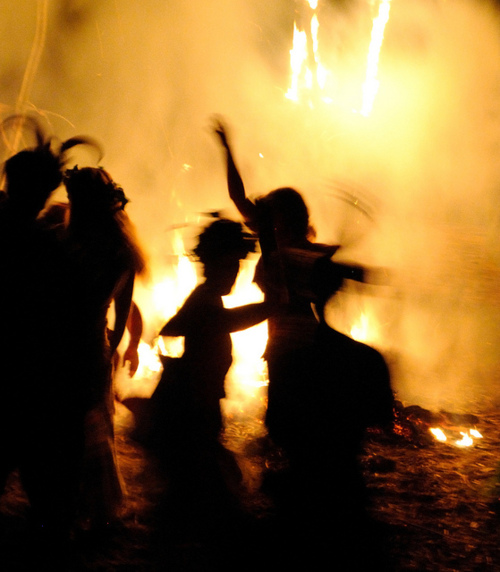
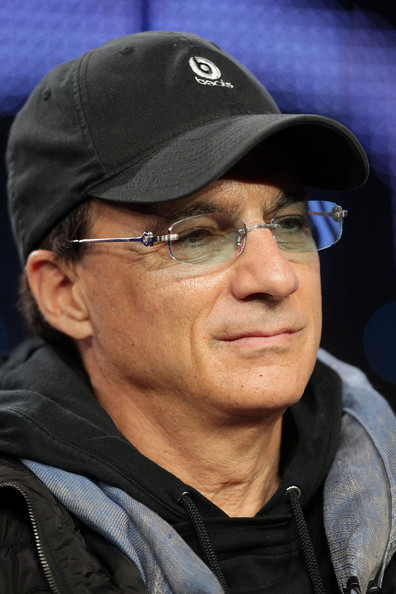 Learning
from Jimmy Iovine
Learning
from Jimmy Iovine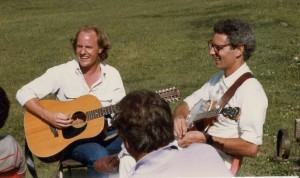
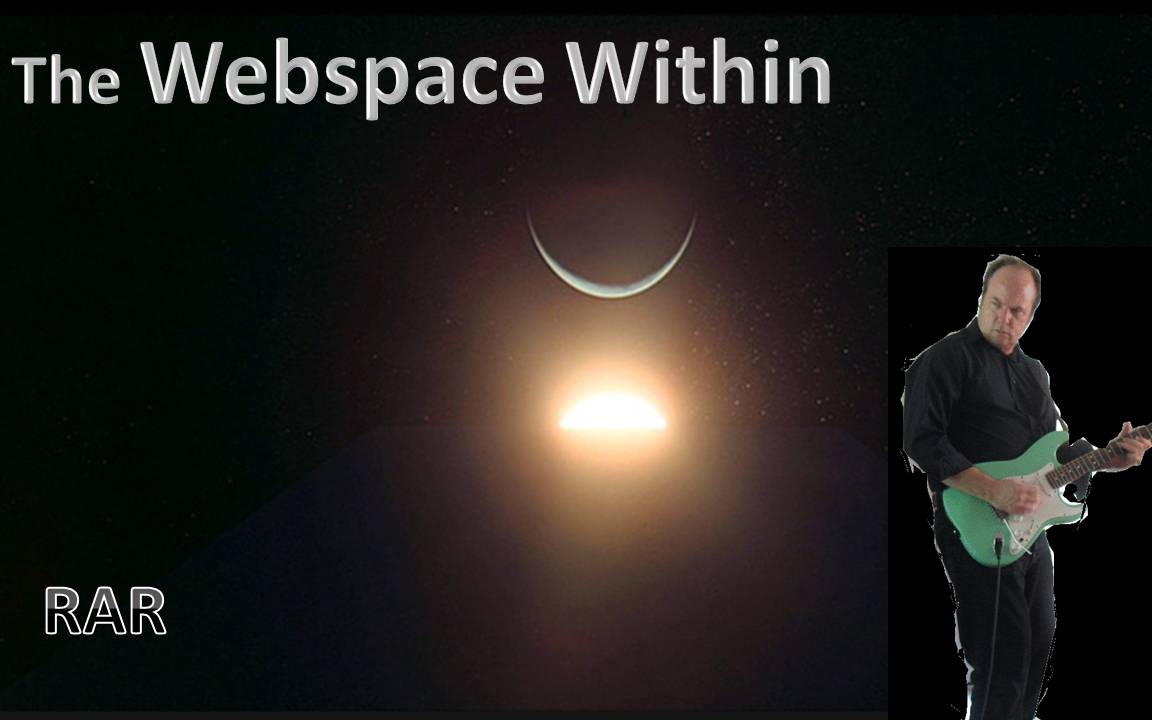
 This
edition we spotlight L.A. songwriter, filmmaker and crowd pleaser JOHN
PIEPLOW, looking rather happy with himself here in this photo to the left. And
well he should, given his unique place in the L.A. entertainment inner
universe. John is a darling of a sophisticated set of Hollywoodland's most
diverse talents, ranging from big name filmmakers like Sydney Pollack and Tim
Robbins to musicians like Chris Squire (Yes) to literary agent/musician Joel
Gotler, who plays in his band. How John Pieplow, who has received performer,
songwriter and guitarist honors at L.A.'s annual Rock City Awards, got to be in
the position he is today is enough to turn anyone into a fan.
This
edition we spotlight L.A. songwriter, filmmaker and crowd pleaser JOHN
PIEPLOW, looking rather happy with himself here in this photo to the left. And
well he should, given his unique place in the L.A. entertainment inner
universe. John is a darling of a sophisticated set of Hollywoodland's most
diverse talents, ranging from big name filmmakers like Sydney Pollack and Tim
Robbins to musicians like Chris Squire (Yes) to literary agent/musician Joel
Gotler, who plays in his band. How John Pieplow, who has received performer,
songwriter and guitarist honors at L.A.'s annual Rock City Awards, got to be in
the position he is today is enough to turn anyone into a fan.


 venues with a hugely divergent range of acts, from Huey Lewis to Ambrosia
and Earth Wind & Fire to Chris Botti to The English Beat. Does this present
any special challenges? Or do you see some vein of similarity running through
those acts that make you the perfect bridge artist for such a roster?
venues with a hugely divergent range of acts, from Huey Lewis to Ambrosia
and Earth Wind & Fire to Chris Botti to The English Beat. Does this present
any special challenges? Or do you see some vein of similarity running through
those acts that make you the perfect bridge artist for such a roster?
